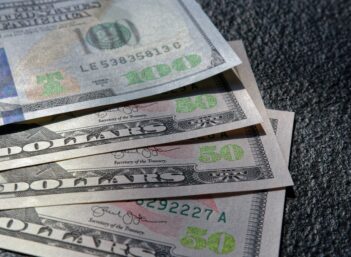If you’ve run up your credit cards, it can feel as if you’ll never pay them off. Balancing credit card debt against mortgages, student loans, and auto loans can feel like a constant juggling act. Fortunately, there are tried-and-true methods to start digging yourself out of credit card debt.
Dig Yourself Out of Credit Card Debt in 10 Steps
Experts agree on several steps to dig yourself out of credit card debt. Many people have paid off their debts using these steps, and you can, too!
1. Stop Using Your Credit Cards
The first step? Stop using your credit cards. Yes, they’re convenient, but you pay a hefty price for such convenience if you don’t pay off the entire balance each month. When people buy and pay using cash, they feel the effects immediately on their wallet. When people pay using credit cards, they tend to spend more. The gap between purchase and payment when using credit cards makes the price seem less important, which encourages people to spend more.
To dig yourself out of debt, it’s important to start by halting all expenses on your credit cards until the balance is paid off.
2. Cut Your Expenses – Live Within Your Means
It may seem obvious, but if you’re in debt, it’s time to live within your means and cut back on expenses. Many people have “champagne tastes on a beer budget,” meaning that they love the finer things in life but don’t have the money to pay for them. Spending on credit cards enables people to enjoy fine things (such as eating out often or designer clothing), but it also racks up debt quickly.
Start by reviewing recurring expenses. Many people pay for the biggest entertainment package they can find on their cable or satellite television provider but enjoy only a fraction of the channels. Consider cutting back to a less expensive package – or eliminate it altogether and enjoy your favorite shows online.
Dining out is an area where many people overspend. Consider dining at home for breakfast and dinner, then packing your lunch for school or work. Avoid shopping as a recreational activity, as well as places where you can be tempted to overspend (like malls and online retailers).
3. Track Your Spending
Studies on consumer spending indicate that tracking expenses is helpful for managing money. It makes sense: You have to know how much you spend (as well as how much you earn) to get better at managing your money.
Track your spending using a spreadsheet, pen and paper, or a free money management app like Mint. Every time you spend money, save the receipt. When you get home, record it in your monthly expense list. Assign categories to each expense such as clothing, utilities, rent, groceries, and dining.
At the end of the month, add all the expenses to determine the total amount you’re spending. You can also add up each category to see where your money is going – and where you may be able to cut expenses.
4. Calculate Your Debt-Free Plan
It’s time to make your plan to dig yourself out of credit card debt. Now that you know how much you earn (and how much you spend), the amount remaining each month can be used to pay off your credit cards. Make a plan to pay an additional amount each month on your credit card debt. Any windfall amounts you receive – such as bonus or commission checks – should be applied towards paying off your debt.
You can also lower your annual percentage rate (APR) and pay your debt off faster
5. Prioritize to Get Out of Credit Card Debt
Not all debt is created equal. If you have two credit cards and one has a 6.5% interest rate and another has 12%, the long-term cost of the loans will be different. By shifting your extra payoff efforts from the lower-interest card to the card with higher interest, you could greatly reduce the total amount you'll owe after interest charges.
Some financial experts recommend the 'debt snowball' technique, which involves paying the minimum on all your debts except for the smallest debt first (you'll make extra payments to pay this one off first). The idea is to eliminate the lowest balance to create positive momentum and psychological encouragement.
After you've paid off the smallest balance, you can apply what you were paying toward the balance of the next smallest debt in line. One by one, you'll pick off your debts until they’re all gone!
6. Consider a Balance Transfer
Consolidating balances from multiple credit cards onto one card (through a balance transfer) may be a good option. A balance transfer involves transferring the money owed on multiple accounts to a single card with a lower interest rate. This could save you hundreds – or even thousands – of dollars in interest charges. Paying off a single card instead of many may feel more manageable to some people.
Balance transfers may involve a fee (usually 3% to 5% of the total balance amount), so be sure the long-run savings outweigh the hit you'll take in transfer fees.
7. Sell Your Unused Stuff
Now is a great time to clean out your attic, basement, and storage sheds to sell unused items. Collectibles, clothing, home appliances, housewares, and other items may be sold on eBay, Etsy, or even at old-fashioned garage sales. The money raised from the sale of unused items should be applied towards your credit card balances (not to buy more stuff).
Bonus: If you clean out your basement or attic and are paying a storage unit fee, you may be able to move the items from the storage unit into your own home and save on monthly fees.
8. Increase Your Income
There are two ways to dig yourself out of debt: reduce expenses or increase income. Selling unused items increases your income, but only temporarily. Taking a part time job or moving to a higher-paying job may be a good way to increase your income and pay off your debt.
Even small amounts earned from babysitting, pet sitting, cleaning homes, or house sitting can make a dent in your debt.
With the internet, you may not have to leave home to increase your income. Freelance work can be obtained online, enabling users to create a profile and market their business skills (e.g. graphic design, transcription, and online research).
9. Negotiate with Creditors
There are two ways to negotiate with creditors: negotiate a lower interest rate and negotiate a lump-sum settlement to close the account.
Credit card companies often run specials for new card holders or others. You may be able to successfully argue that offering a lower rate to enable you to pay off more of your debt is a benefit to the card company. Try these magic words to slash your APR and potentially save hundreds of dollars – it’s certainly worth a try.
Paying off credit cards in a lump sum settlement isn’t ideal, but if you owe tens of thousands of dollars, it may be the only option to make headway on your debt. Lump sum settlements can negatively affect your credit score as it is considered a default, so be sure you're clear on the implications before you agree to the terms. For example, it may impact your ability to secure a mortgage to buy a home (if you plan to do so in the next several years).
10. Track – and Celebrate – Paying off Debt
Track and monitor your progress as you chip away at your debt. It may take months or years to pay off significant debts, but the effort is well worth it.
Use a spreadsheet to chart your debts as they decrease. Some people find that creating a line graph offers an incentive to pay off more debts.
When you finally pay off your debt, it’s time to celebrate your freedom (not by shopping again!).
The freedom of being completely debt free is unparalleled. You won’t be shackled to a job you hate simply because you need the money to pay off your debt. Instead, freedom from debt opens many opportunities to live the life of your dreams – within your budget, of course.
Bonus Tips for How to Get Out of Credit Card Debt Fast
You may be tempted to file for bankruptcy to get out of credit card fast. Before taking that drastic step, consider a few other options:
Make Drastic Spending Cuts
Bring your expenses down to bare bones such as rent, utilities, and food. Make it a challenge to yourself to see how little you can live on. Find free entertainment in your city or online, eat simple meals, and cut back on all expenses.
Consolidate Debts
Find and consolidate all of your debts into one low-interest loan.
Use a Home Equity Loan
A home equity loan can provide you with a lump sum loan. Make sure that the interest rate on the home equity loan is lower than your credit card APR, then use every penny to pay off the high-interest credit card loans.
Home equity loans must be repaid. If you default on them, the bank can repossess your home. Be certain of your ability to pay off this potentially lower-interest loan.
How to Pay off Credit Card Debt When You Have No Money
Paying off credit card debt requires either drastic spending cuts or increased income. If you can’t cut any expenses – and there are no options for earning more money – you may be forced to consider debt settlement or bankruptcy.
Debt Settlement Company Options
Debt settlement companies often agree to help you settle outstanding debts such as credit cards, but they charge a high fee to do so. Although it can be a relief to finally take action about your outstanding debts, some debt settlement companies encourage customers to stop making payments on their debts. This is risky. It increases interest fees and penalties, forcing you to pay more over time. It can also negatively impact your credit rating.
Some debt settlement companies encourage people to put their money into a third-party account (such as a bank account) so the debt company can pay creditors. Ask if there are fees to use such an account before agreeing to this process.
Lastly, some credit card companies refuse to do business with debt settlement companies, so you may find yourself still paying off cards while the debt settlement company works with the others.
Bankruptcy
Filing for bankruptcy may seem like a good solution. After all, the commercials promise that filing for bankruptcy wipes the financial slate clean and gives you a fresh start. It’s not a magic wand that whisks away your debts: It’s a serious legal proceeding with consequences that can be felt for years to come.
During bankruptcy proceedings, you’ll be asked to compile a list of your debts and assets. A judge and a court trustee will review all of your documents (e.g. bills, income statements, credit card statements). If the court determines that you have any assets, you’ll be forced to sell them to pay off as many creditors as possible. The court then decides which debts to discharge, meaning you are no longer liable to pay them.
Although this sounds good, the drawbacks are plentiful:
- Bankruptcy filings remain on your credit report for years
- Bankruptcy negatively impacts your credit score.
- Bankruptcy filings are in the public domain, so anyone can look them up.
- A potential employer may be wary of hiring someone with a history of bankruptcy filings.
Credit Counseling Company
If you have no money, a credit counseling company offers a good compromise between debt settlement agencies and going it alone.
Credit counseling companies provide guidance to help you get out of credit card debt. After a private consultation, the company will ask you to provide evidence of your debts and income. They’ll also help you understand the options available to you to get out of debt fast.
The credit counseling company may suggest a debt management program which enables the company to act as the intermediary between you and your creditors. They may negotiate lower interest rates on your behalf – or set up a payment plan with the creditors – so you can pay off your debt more efficiently.
Watch out for Credit Card Debt Scams
Debt settlement companies are among the worst potential scams. Most encourage participants to place their money in escrow accounts for 36 months or more. They require you to make payments into that account which is then used by the debt settlement company to pay creditors.
In addition to potential fees associated with such bank accounts, creditors are not obligated to work with debt settlement firms. If creditors choose not to, you’re still liable for your debts. You could find yourself paying into the high-fee account to work with the debt settlement company – and may still be making payments on high-interest credit cards.
The Bottom Line of Getting Out of Credit Card Debt
Getting out of credit card debt isn’t easy, but many people have done so successfully. By using many of the steps discussed here, one woman paid $54,000 worth of credit card debt while still living within her family’s means. It’s not easy, but it can be done with determination and persistence.




